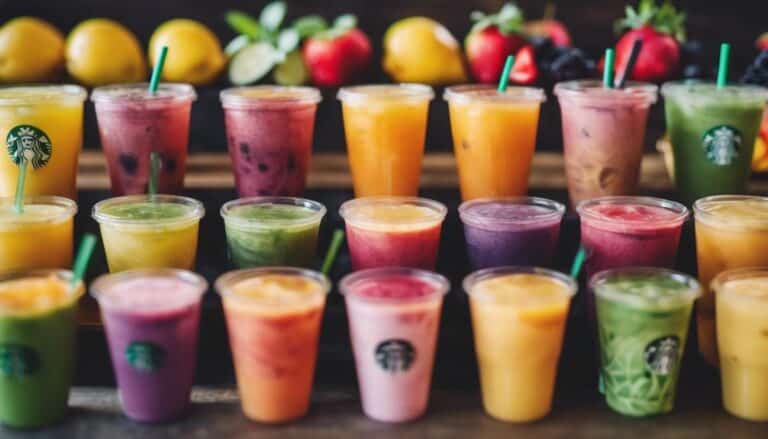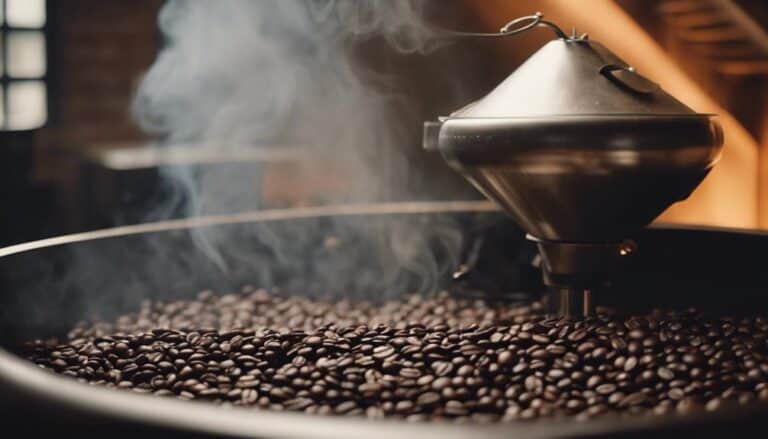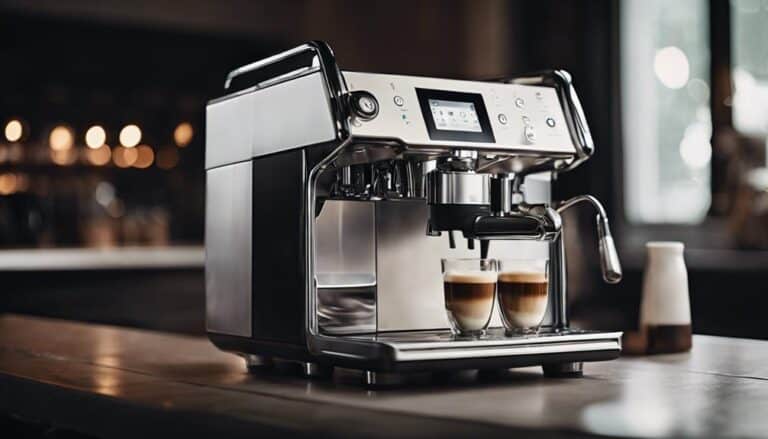How Much Caffeine in Starbucks Decaf Coffee?
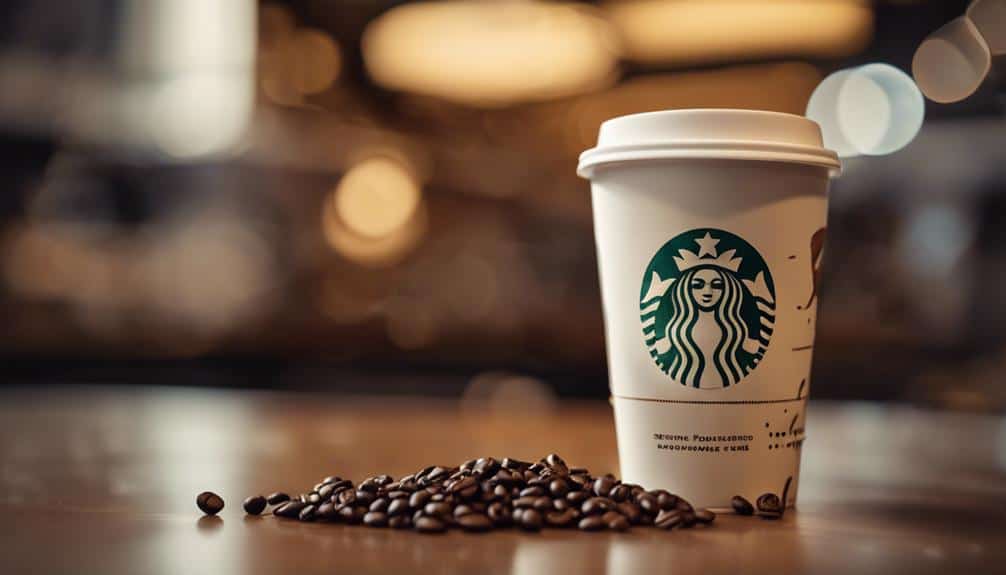
So, you're savoring your Starbucks decaf coffee, trying to limit your caffeine intake, but have you ever wondered about the exact amount of caffeine in that steaming cup? Well, let me tell you, the caffeine content in Starbucks decaf coffee might surprise you. It's not just about the taste; there's a whole science behind how much caffeine remains in that seemingly innocent cup of decaf. Stay tuned to unravel the mystery behind Starbucks decaf coffee's caffeine levels and how they stack up against your expectations.
Starbucks Decaf Coffee Caffeine Content
In Starbucks Decaf Coffee, the caffeine content typically ranges from 12 to 30 mg per serving, depending on the cup size selected. The decaffeination process of Starbucks coffee involves the use of 100% Arabica Decaffeinated Coffee Beans. This specific type of coffee bean is chosen for its rich flavor profile and is processed to remove caffeine while retaining the intricate taste characteristics of Arabica beans. Starbucks adheres to strict international standards for decaffeination, ensuring that at least 97% of caffeine is removed during the process.
The variation in caffeine content across different cup sizes at Starbucks provides flexibility for customers seeking to manage their caffeine intake. A 12 oz cup of decaf coffee typically contains around 15 mg of caffeine, while a larger 16 oz serving may have up to 25 mg. For those looking for even lower caffeine levels, the smallest cup size available at Starbucks offers a decaf option with only 12 mg of caffeine. This range of caffeine content caters to diverse preferences and allows customers to enjoy decaf coffee without compromising on flavor.
Caffeine Levels in Starbucks Decaf
The varying caffeine levels in Starbucks decaf coffee, determined by cup size, offer customers a range of options to manage their caffeine intake effectively.
When opting for a 16 fl oz cup, Starbucks Decaf Coffee typically contains 25 mg of caffeine. However, the caffeine content varies across different sizes, with a Short containing 15 mg and a Venti containing 30 mg.
For those looking to minimize caffeine consumption further, a 16 oz serving of decaffeinated brewed coffee from Starbucks contains about 12-13.4 mg of caffeine.
It's essential to note that studies have shown caffeine levels in Starbucks decaf drinks can range from 3.0 to 15.8 mg, indicating slight variations in caffeine content.
Controlled studies have confirmed that decaffeinated coffee, including Starbucks offerings, isn't entirely free of caffeine, reinforcing the need for awareness when managing caffeine intake.
Customers can make informed choices based on cup size to align with their desired caffeine levels when indulging in Starbucks decaf options.
Decaf Coffee at Starbucks: Caffeine Amount
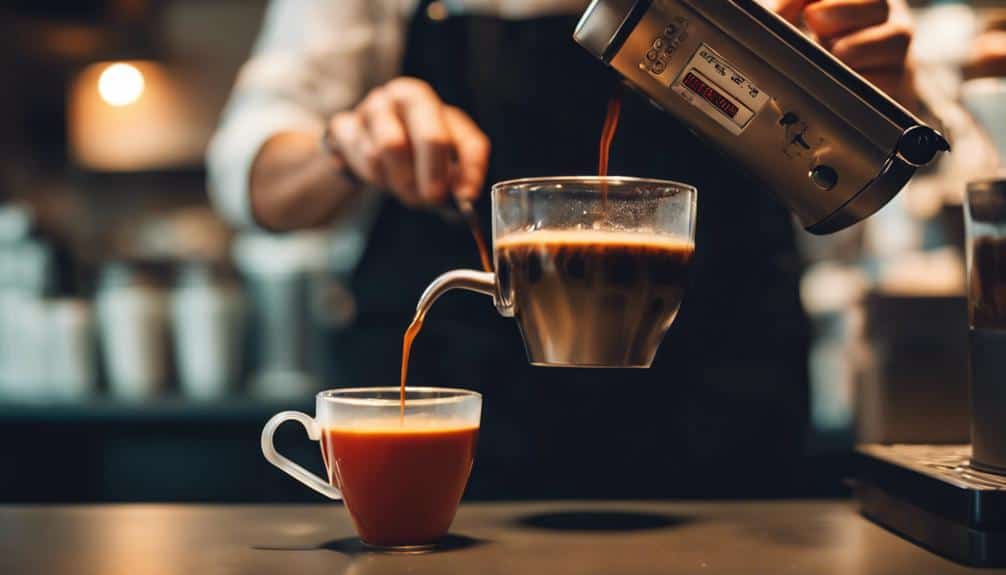
When examining the caffeine content in Starbucks decaf coffee, it's crucial to understand the comparative caffeine levels. Factors such as the brewing method utilized by Starbucks can greatly impact the final caffeine amount in their decaf offerings.
Caffeine Content Comparison
Comparing the caffeine content in Starbucks Decaf Coffee to that of other beverages reveals a significant disparity, with only 25 mg of caffeine in a 16 fl oz cup, setting it apart as a low-caffeine option among popular choices like Monster energy drink. This caffeine variance underscores the appeal of decaf espresso for those seeking to reduce their caffeine intake while still enjoying the flavor of coffee.
Starbucks Decaf Coffee provides a milder stimulant effect compared to its caffeinated counterparts, making it a suitable choice for individuals sensitive to caffeine or looking to limit their consumption. Understanding the caffeine content in Starbucks Decaf Coffee can help consumers make informed decisions based on their preferences and needs, whether for a relaxing evening beverage or a morning pick-me-up with minimal caffeine.
Brewing Methods Impact
In exploring the impact of brewing methods on the caffeine content of decaf coffee at Starbucks, it becomes apparent that the process greatly influences the final caffeine levels in each serving. The type of coffee beans used, the decaffeination process employed, and the brewing technique all play significant roles in determining the amount of caffeine present in the decaf coffee.
Starbucks employs various decaffeination methods, such as the Swiss Water Process or the direct solvent method, to remove caffeine from the beans before roasting. The brewing method, whether it's drip, French press, or espresso, further affects the extraction of caffeine from the beans.
Understanding these processes is important in comprehending the caffeine content variations found in Starbucks decaf coffee offerings.
Starbucks Decaf Coffee Caffeine Comparison
With a caffeine content of 25 mg per 16 fl oz cup, Starbucks decaf coffee stands out for its significantly lower caffeine levels in comparison to other caffeinated beverages like energy drinks and instant coffee. This minimal caffeine content makes decaf coffee a suitable choice for individuals looking to limit their caffeine intake without sacrificing the flavor and enjoyment of a good cup of coffee. In contrast, popular energy drinks such as Monster contain a much higher caffeine content, with 160 mg per serving, while instant coffee typically has around 60 mg per 16 fl oz cup.
Starbucks guarantees that their decaf coffee maintains a full-bodied flavor profile while undergoing a decaffeination process that removes 97% of the caffeine. This meticulous approach to decaffeination allows coffee lovers to enjoy a rich and satisfying cup of decaf coffee at any time of the day without the stimulating effects of caffeine. The careful balance of flavor and caffeine content in Starbucks decaf coffee makes it a popular choice for those seeking a more relaxed coffee experience.
Understanding Starbucks Decaf Caffeine
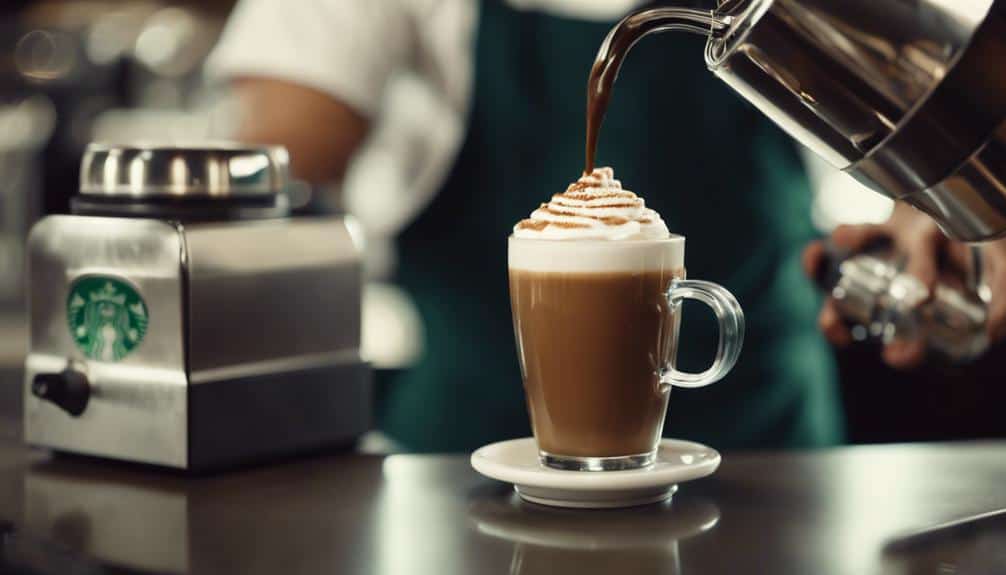
When considering the caffeine content in Starbucks decaf coffee, it's important to compare it to regular coffee for a better perspective.
Understanding the process of how decaf coffee is made sheds light on why trace amounts of caffeine may still be present.
Recognizing the nuances in decaffeination methods can provide insight into the variation of caffeine levels in decaf coffee offerings.
Caffeine Content Comparison
Analyzing the caffeine content of Starbucks decaf coffee reveals a stark difference compared to other caffeinated beverages like energy drinks and instant coffee. While a 16 fl oz cup of Starbucks Decaf Coffee contains 25 mg of caffeine, regular caffeinated drinks can range from 80 mg to over 300 mg per serving.
Decaf coffee, known for its lower caffeine content, provides a milder stimulant effect suitable for those seeking to reduce their caffeine intake. Starbucks' decaffeinated brewed coffee offers even less caffeine, with 12-13.4 mg in a 16 oz serving.
This significant contrast highlights the conscious choice Starbucks makes to cater to customers looking for the flavor of coffee without the full caffeine impact, making their decaf options a unique choice in the world of caffeinated beverages.
Decaf Coffee Process
During the decaffeination process for Starbucks decaf coffee, a significant amount of caffeine, 97% or more, is eliminated to achieve a lower caffeine content. This process involves intricate steps that guarantee the final product is nearly caffeine-free while retaining the rich flavor of the coffee beans.
The decaffeination process for Starbucks decaf coffee includes:
- Direct Contact Method: In this method, the green coffee beans are steamed for about 30 minutes to open their pores, then soaked in a solvent to remove caffeine.
- SWISS WATER Process: This method uses water, temperature, and time to decaffeinate coffee beans without the use of chemicals.
- Natural Decaffeination Process: Some Starbucks decaf coffee beans undergo a natural decaffeination process using ethyl acetate derived from fruits to extract caffeine.
Decaf Coffee Caffeine: Starbucks Insights
In Starbucks Decaf Coffee, the caffeine content is carefully managed to provide a satisfying coffee experience with minimal stimulant effects. This attention to detail guarantees that customers can enjoy the rich flavors of Starbucks' decaffeinated coffee without the jitters often associated with regular caffeinated beverages. The caffeine content in Starbucks Decaf Coffee can vary depending on the cup size selected, with a 16 fl oz cup containing around 25 mg of caffeine.
When compared to their regular brewed coffee, which typically contains 12-13.4 mg of caffeine in a 16 oz serving, Starbucks' decaf option offers a notably reduced caffeine intake. By using Arabica beans for their decaf coffee, Starbucks maintains a full-bodied flavor profile while keeping caffeine levels low.
Additionally, Starbucks adheres to international standards for decaffeination, ensuring that their decaf coffee undergoes a process that removes approximately 97% of caffeine, further emphasizing their commitment to providing a quality decaffeinated coffee option.
Starbucks Decaf Coffee Caffeine Analysis
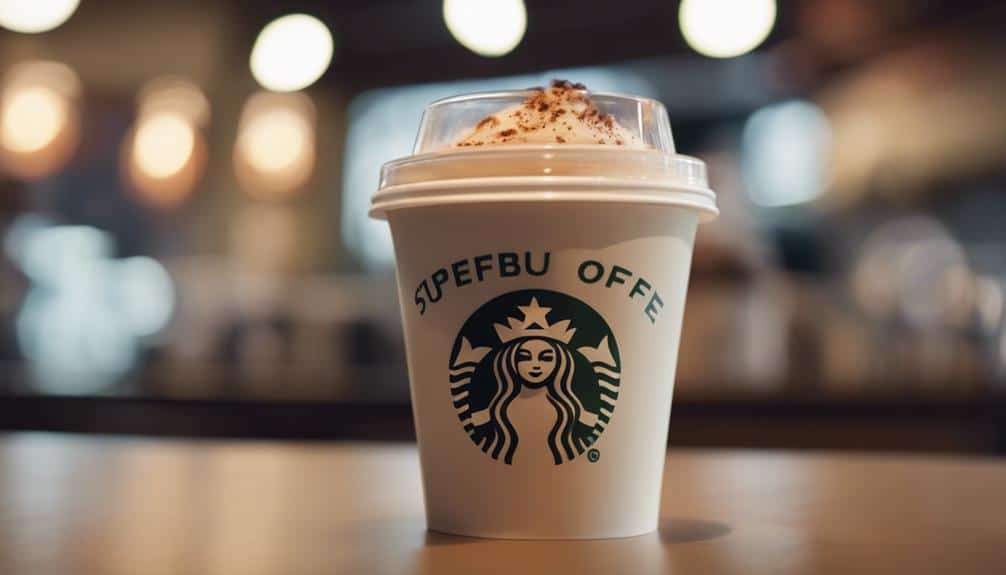
Studying Starbucks Decaf Coffee's caffeine composition provides essential insights into its meticulously controlled caffeine levels and flavor profile. When analyzing the caffeine content in Starbucks decaf coffee, several key points come to light:
- Guaranteed Caffeine Levels: Starbucks guarantees a consistent caffeine content in their decaf coffee, with 25 mg found in a 16 fl oz cup. This attention to detail allows customers to enjoy the same caffeine experience with every order.
- Variability in Cup Sizes: Different cup sizes at Starbucks offer varying caffeine levels in decaf coffee. From the Short (15 mg) to the Venti (30 mg), customers can choose their preferred caffeine intake based on their cup size selection.
- Decaffeination Process Precision: The decaffeination process Starbucks employs aims to remove 97% of caffeine, aligning with international standards. This meticulous process results in a full-bodied coffee flavor with minimal caffeine, catering to individuals seeking a flavorful yet low-caffeine coffee option.
Caffeine Concentration in Starbucks Decaf
Analyzing the caffeine concentration in Starbucks Decaf Coffee demonstrates meticulous control over caffeine levels to guarantee a consistent and low-caffeine experience for customers. Starbucks carefully manages the caffeine content in their decaffeinated coffee to make sure that each cup contains approximately 25 mg of caffeine in a 16 fl oz serving. This attention to detail sets Starbucks apart in the world of decaf beverages, where consistency is key.
Decaffeinated brewed coffee at Starbucks offers a slight variation in caffeine content, ranging from 12 to 13.4 mg in a 16 oz serving, depending on the specific brew and cup size selected. Despite these minor differences, Starbucks adheres to international standards for caffeine removal in their decaf coffee, ensuring a high-quality product for their customers.
Compared to other caffeinated beverages like energy drinks and sodas, the caffeine content in Starbucks Decaf Coffee is significantly lower, making it a preferred choice for those seeking a milder caffeine experience without compromising on flavor or quality.
Exploring Starbucks Decaf Coffee Caffeine
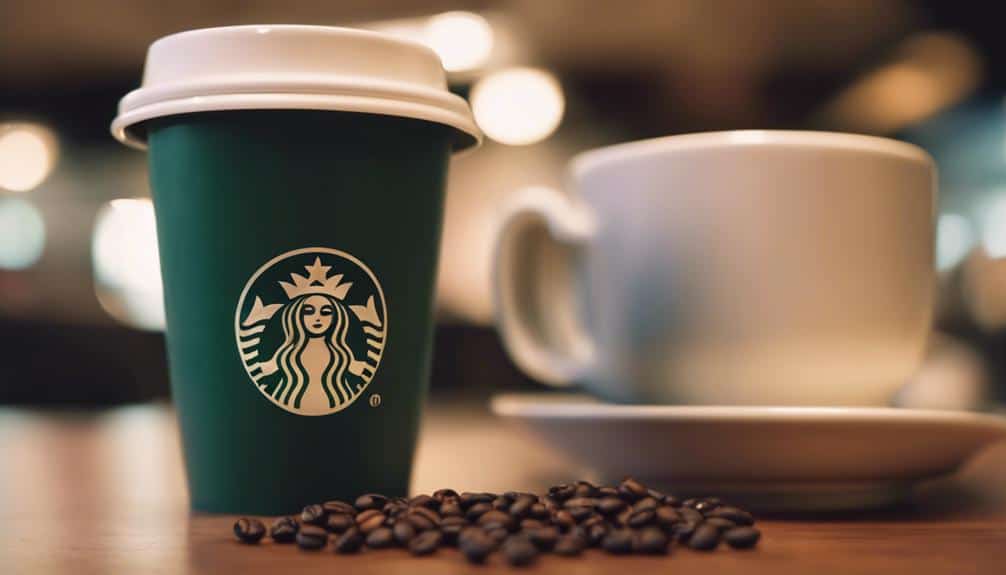
Analyzing the caffeine composition within Starbucks Decaf Coffee reveals careful monitoring of caffeine levels to guarantee a consistent and low-caffeine experience for patrons. When exploring Starbucks decaf coffee caffeine content, several key points emerge:
- Caffeine Amount: Starbucks decaf coffee contains 25 mg of caffeine in a 16 fl oz cup, offering a mild stimulant effect compared to regular coffee.
- Variability: The caffeine content in Starbucks decaf coffee can vary based on cup size, with a Short having 15 mg and a Venti containing 30 mg, providing options for different caffeine sensitivities.
- Decaffeination Process: Different decaffeination processes ensure a minimum of 97% removal of caffeine, meeting stringent standards set by the U.S. FDA. This meticulous approach guarantees a flavorful decaf coffee suitable for consumption at any time of day, catering to those seeking a coffee experience with minimal caffeine jitters.
Conclusion
In conclusion, Starbucks decaf coffee offers a range of caffeine content depending on the cup size, with approximately 12-30 mg per serving.
The decaffeination process guarantees that at least 97% of caffeine is removed, allowing customers to enjoy a flavorful coffee experience with substantially lower caffeine levels compared to regular coffee options.
Understanding the caffeine levels in Starbucks decaf coffee can help individuals make informed choices based on their caffeine tolerance and preferences.

